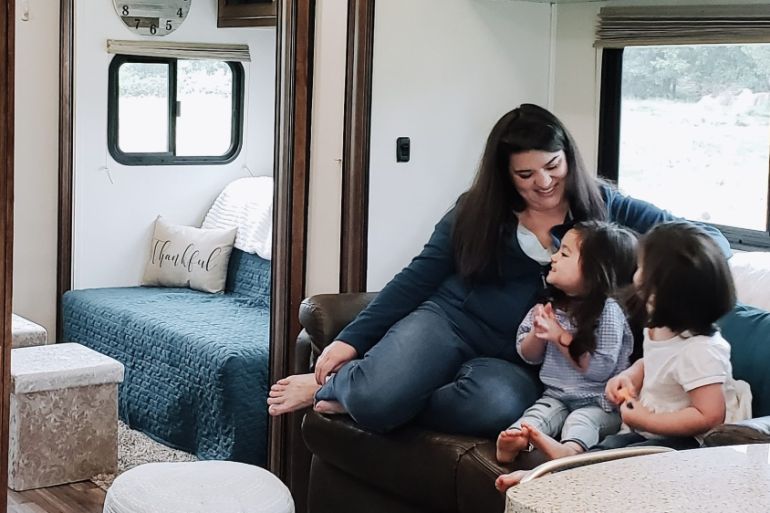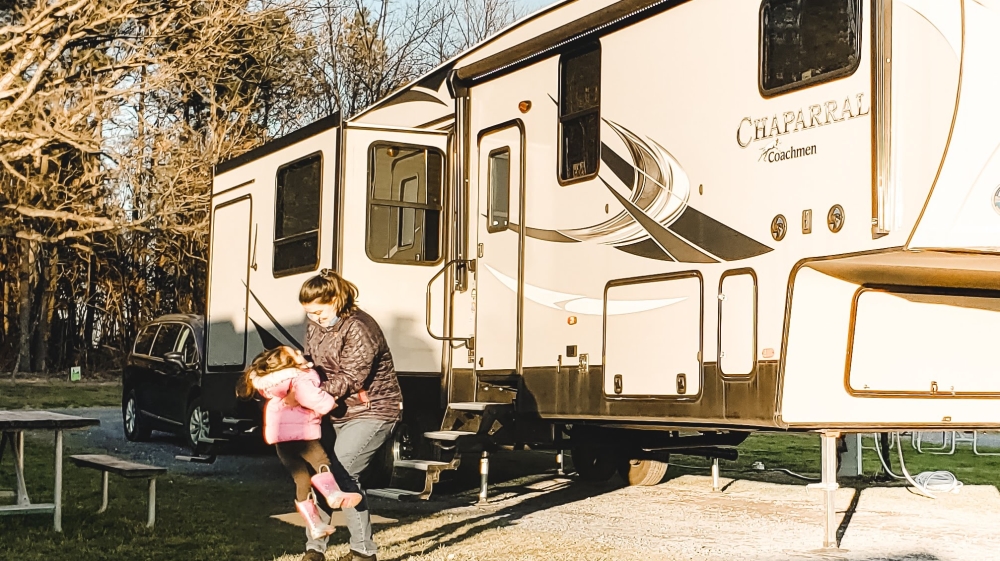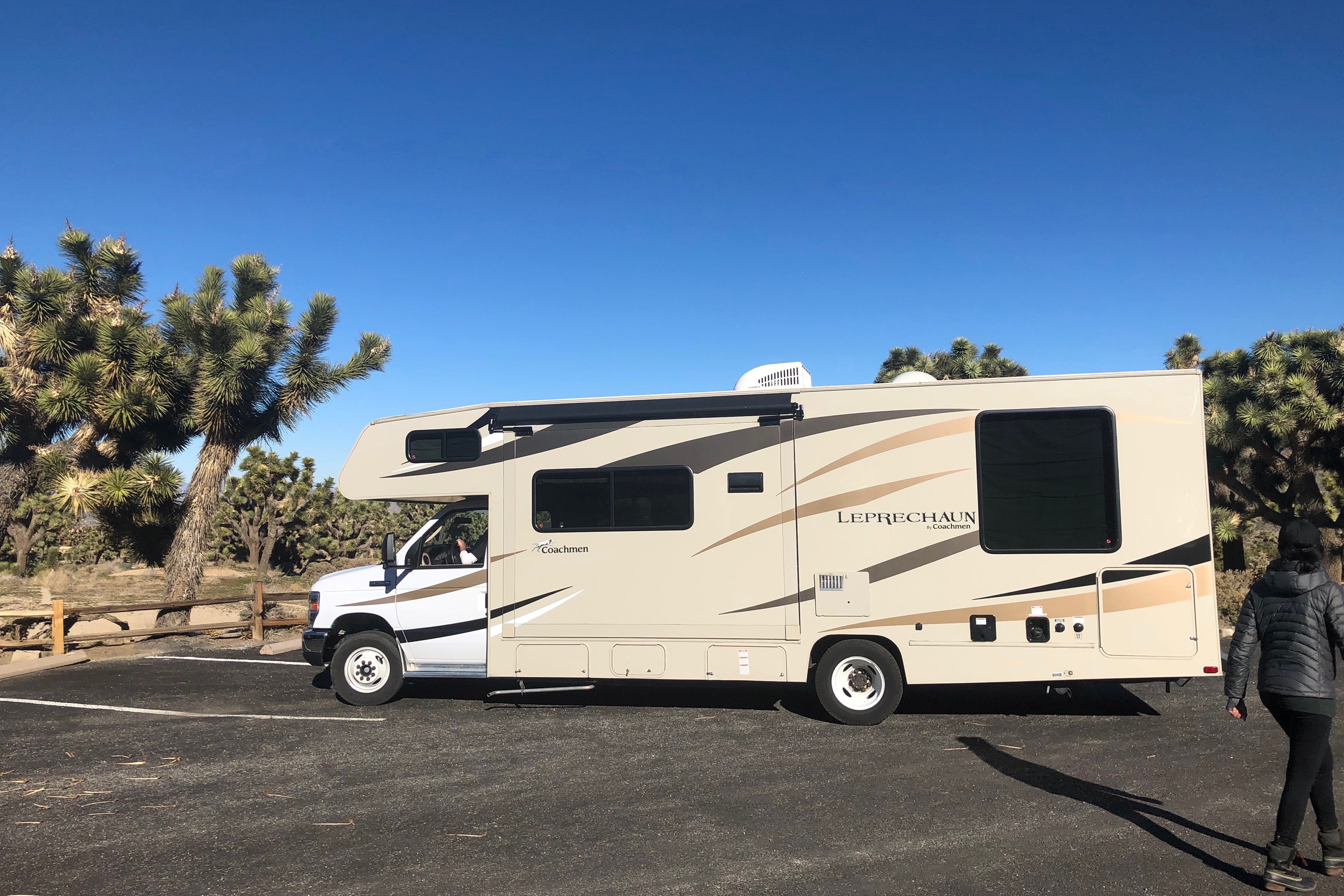US RV sales surge as socially distant travel sweeps nation
More families are buying and renting vans to vacation during the coronavirus pandemic.

Freelance writer Angelica Kajiwara has narrowed travelling with her three toddlers down to a science. She stocks her recreational vehicle (RV) with foods she knows they’ll eat, and she books a campground with reliable Wi-Fi so she and her husband can work remotely. Then, she hits the road.
The family usually travels off and on from early May to the end of September, with Kajiwara and her husband homeschooling and caring for their four-year-old twins and three-year-old daughter.
Keep reading
list of 4 itemsThousands protest against over-tourism in Spain’s Canary Islands
How one Mexican beach town saved itself from ‘death by tourism’
Photos: Tourist numbers up in post-war Afghanistan
“It’s our tiny house and we take it everywhere with us. The kids know their room, they know their pillows, they have all their toys,” Kajiwara, 38, told Al Jazeera.
The family brought their three-bedroom, 42-foot (13-metre) RV – which they tow behind a truck to campgrounds – two years ago for $50,000. While clocking thousands of miles in the car with three kids under the age of four may strike some people as stressful, Kajiwara embraces it.
“We don’t Airbnb because I have three toddlers, and they can destroy somebody’s rental home in a very short period of time,” she laughed. “There’s no vacation transition. You park that thing and you open the door and you’re in some beautiful new place that you can go explore. It’s totally worth the time and effort and money that it takes to do it.”
Kajiwara parlayed that sense of adventure into a full-time job writing about travelling with kids. But with many of her writing assignments postponed or cancelled due to the coronavirus pandemic, knowing that her family of five – plus her mom – can go on a budget-friendly vacation is now more important than ever.

Kajiwara estimates she’s lost $30,000 to $50,000 in income so far, and she’s far from alone.
Across the United States, financial worries – coupled with concerns about contracting COVID-19 – have led to a surge in interest in RV travel. Travellers who are both eager to get outside after months of quarantine but who are still wary of flying, staying in hotels or using public bathrooms are looking to the self-contained vehicles as an answer, said Richard Curtin, a research associate professor at the University of Michigan’s Survey Research Center who studies RV owners’ attitudes.
“The RV industry is the star of the travel industry at the moment because getting consumers back to where they were in air travel or staying at hotels or motels will take a long time,” Curtin told Al Jazeera. “But the RV is considered a safe and secure environment to transport your family, so they have that advantage.”
Home away from home
While many travellers have cancelled or postponed international and domestic trips that require air travel, 41 percent of campers say they still plan to take their camping trips this year, according to a report by Kampgrounds of America and Cairn Consulting Group.
Of the 4,500 US and Canadian leisure travellers surveyed, 46 percent said camping would be the safest type of travel when COVID-19 restrictions are lifted, versus 8 percent who viewed international air travel as the safest option.
The US already has a huge RV industry that generates $114bn per year and supports more than half a million jobs, according to the RV Industry Association. The group estimates that 98 percent of RVs sold in the US are made in the US, and the industry pays $12.2bn in taxes.
RV manufacturers who were shut down from late March through April are now ramping up production, Curtin said, “responding to what dealers say are significant increases in orders, especially by newcomers – new entrants, to the RV market.”
An estimated 25 million Americans on average go RVing each year, according to the RV Industry Association, and interest has been on the rise for a while.
“In 2017, the industry sold about 500,000 units – the best year since the mid-1970s,” Curtin explained. An increase in eco-friendly, lightweight RV models that can be towed behind smaller vehicles has also opened things up. The majority of RVs on the road in the US are towable ones, and about 12 percent of owners use motorised models that are self-contained and can be driven like a bus.

While cross-country road trips are often associated with RVs, the coronavirus pandemic is also making people want to stick closer to home – without actually having to stay at home.
“Our data shows that even before the coronavirus pandemic, RVers were camping within 150 miles [240km] of their home,” David Basler, the vice president of membership and marketing for the National Association of RV Parks and Campgrounds, told Al Jazeera. “It’s creating an opportunity for people who want to get outside to do so in a very responsible way and in a way that makes them feel safe.”
Travelling on a budget
Kajiwara says RV travel is also an easy way for her to stick to a budget. With their 20-year financing plan, her family pays $400 per month for their RV, which “comes out to about what you would spend to go to a beach house for a couple of weeks over the course of the year,” she says.
The family joined Thousand Trails, a programme that lets them pay $599 per year to camp up to 30 days at one of its campgrounds. “We always know that for that price, we’re going to get a month’s worth of family vacation every year,” says Kajiwara. It’s drastically cheaper than 30 nights at a hotel, and Kajiwara brings the family’s food with them to avoid surprises, too.
“I love that I can bring it all with us, and I don’t have to shop at some mom-and-pop grocery store in the middle of nowhere that’s going to cost us three times as much,” she said.
But other costs do add up, she said. “Gas is a major consideration. We took a trip from Virginia to Tennessee to visit family and back, and we spent $1,000 on gas,” she explained.
But a dramatic drop in energy prices this year as coronavirus decimates demand has also led to lower gas prices, which Curtin says could also be driving RV demand.
Kajiwara says she has seen a surge in interest in her Facebook groups from newcomers who want to learn more about “van life”. She encourages families to do their research before renting or buying an RV and hitting the road.
Her family’s first RV trip to a Maryland campground was a memorable one, she said, because there was so much that hadn’t bargained on.
“We showed up and we didn’t have the right hose to dump our sewer tanks, so we ended up borrowing someone else’s, which was so kind but so disgusting,” Kajiwara said, adding that they had to make 11 trips to Walmart to pick up gear they had not realised they needed.
They did, however, anticipate the need to learn how to navigate the open road while towing an RV.
“We actually paid someone to come teach us how to drive it so that we wouldn’t kill ourselves or someone else, because it’s absolutely huge,” she said.

Some RV owners are offering to drive their rigs to campsites so that newcomers can rent them there, Kajiwara said, which can be a good option. “They’re not plug-and-play at all, you can’t just roll out and have your RV behind you,” she added. “Campgrounds are also so hard to find, so it’s going to be interesting to see what happens with this major influx of people.”
Campgrounds reopen
Popular campgrounds can fill up a year in advance, and some have fewer spaces available because of social-distancing guidelines. Other private campground owners are struggling to reopen after sweating through more than a month and a half without revenue, Basler said.
“The RV and campground industry have always been resilient, even after extremely tough times – after 9/11, and during the recession of 2008 and 2009,” Basler said. “Unfortunately, this situation is a little different. Some parks are not going to make it, while other parks will get through it.”
The campground owners’ association recently retooled its GoCampingAmerica website to help campers plan their trips and find open parks. They’re also recommending campground owners keep bathhouses and laundry facilities closed whenever possible to prevent the spread of COVID-19, Basler said.
What is normally a friendly, face-to-face campground culture has also been transformed by online check-in processes and spaced-out sites, he added.
Even so, many owners are still trying to offer up the bingo, crafts and other activities they always did, sometimes over Zoom.
But as travellers look to make last-minute plans, simply spending time outdoors after so much time inside may be the ultimate lure to an enduring RV love affair.
“When you’re in an RV travelling across the country, you can stop when you want to and see things you can’t see from 30,000 feet [9,140 metres],” Basler said. “It’s a totally different experience for people, and when they do it for the first time, they’re often hooked.”